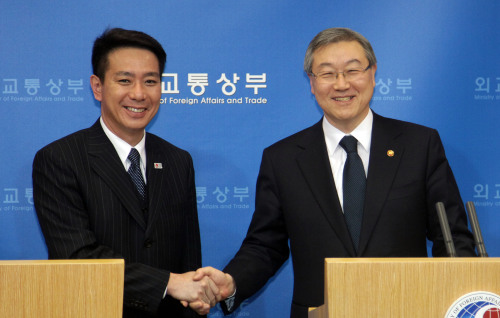Japanese minister puts inter-Korean dialogue ahead of Tokyo-Pyongyang talks
South Korean President Lee Myung-Bak said Saturday that North Korea’s new enriched uranium program should be dealt with by the U.N. Security Council, his spokeswoman said.
“The issue of North Korea’s uranium enrichment program should be referred to the U.N. Security Council,” Lee was quoted as saying when he met with Japanese Foreign Minister Seiji Maehara.
South Korea’s Foreign Minister Kim Sung-hwan said in a recent interview that the program was designed to make nuclear weapons, rebutting Pyongyang’s claims that it is for peaceful use.
“I absolutely agree,” Maehara was quoted as telling Lee.
The North, which is already nuclear-armed, heightened regional security fears last November by revealing an apparently operational uranium enrichment plant to a visiting U.S. expert.
Pyongyang says the plant will fuel an experimental light water reactor now under construction to generate electricity.
But senior U.S. and other officials fear it could easily be reconfigured to produce weapons-grade uranium to augment the country’s existing plutonium stockpile.
The North quit the six-party nuclear disarmament talks in April 2009 and conducted its second atomic weapons test a month later in protest the “hostile” U.S. policy toward it.
South Korean President Lee Myung-Bak said Saturday that North Korea’s new enriched uranium program should be dealt with by the U.N. Security Council, his spokeswoman said.
“The issue of North Korea’s uranium enrichment program should be referred to the U.N. Security Council,” Lee was quoted as saying when he met with Japanese Foreign Minister Seiji Maehara.
South Korea’s Foreign Minister Kim Sung-hwan said in a recent interview that the program was designed to make nuclear weapons, rebutting Pyongyang’s claims that it is for peaceful use.
“I absolutely agree,” Maehara was quoted as telling Lee.
The North, which is already nuclear-armed, heightened regional security fears last November by revealing an apparently operational uranium enrichment plant to a visiting U.S. expert.
Pyongyang says the plant will fuel an experimental light water reactor now under construction to generate electricity.
But senior U.S. and other officials fear it could easily be reconfigured to produce weapons-grade uranium to augment the country’s existing plutonium stockpile.
The North quit the six-party nuclear disarmament talks in April 2009 and conducted its second atomic weapons test a month later in protest the “hostile” U.S. policy toward it.

In a joint news conference after talks with his South Korean counterpart in Seoul on Saturday, Maehara said inter-Korean dialogue should be the starting point for talks with North Korea and urged the communist nation to take specific steps demonstrating its commitment to denuclearize.
“For dialogue with North Korea, the North should demonstrate through specific action its sincere willingness to carry out its own commitment to denuclearization,” he said.
“Dialogue with North Korea should first be held between the South and the North.”
Maehara’s one-day visit to Seoul came after he expressed a willingness to hold direct talks with North Korea this year to tackle Pyongyang’s nuclear and missile programs and past abductions of Japanese nationals. Pyongyang welcomed the suggestion.
The move, however, had drawn concerns that it might send the wrong message to the North’s provocative regime, which is refusing to take responsibility for its deadly shelling of a South Korean island in November as well as its March sinking of a South Korean warship.
Still, Maehara said that Japan wants to “resolve all issues between Japan and North Korea through dialogue” and that Tokyo-Pyongyang talks are not necessarily bound by six-party nuclear negotiations, suggesting that Tokyo would seek direct talks if the conditions are right.
“Japan-North Korea talks should take place under appropriate circumstances, with moves of six-party talks taken into consideration,” Maehara said. He urged the North to show a “forward-looking and sincere attitude” to resolve the abduction issue as well as concerns about the North’s nuclear and missile programs.
South Korea, the U.S. and Japan have taken a united stance on North Korea, urging the communist nation to first improve relations with South Korea and demonstrate its denuclearization commitment through action if six-party talks, suspended since December 2008, are to reopen.
Maehara said that Japan is firmly committed to the trilateral cooperation on North Korea.
South Korean Foreign Minister Kim said he and Maehara reaffirmed that North Korea’s uranium enrichment program is a violation of U.N. Security Council resolutions as well as Pyongyang’s own 2005 pledge to end its nuclear program and that the two countries should respond sternly to the move.
Relations between South Korea and Japan are in good shape after Japanese Prime Minister Naoto Kan offered a renewed apology in August for Tokyo’s 1910-45 colonial rule of the Korean Peninsula, promising to return centuries-old royal Korean books to Seoul and take other steps backing up the apology.
Kim and Maehara told the conference that they agreed to work closely together to further move the bilateral relations forward and to realize the return of royal archives and other projects at an early date.
The two also discussed Japan’s calls for greater security cooperation and a free trade agreement with South Korea.
Maehara asked for an early resumption of free trade talks and the two sides agreed to keep working together to create the right atmosphere for it, Kim said.
Kim also said that the two sides agreed to seek security cooperation in a way that contributes to peace and stability on the Korean Peninsula and the international community.
(From news reports)









![[Kim Seong-kon] Democracy and the future of South Korea](http://res.heraldm.com/phpwas/restmb_idxmake.php?idx=644&simg=/content/image/2024/04/16/20240416050802_0.jpg&u=)







![[KH Explains] Hyundai's full hybrid edge to pay off amid slow transition to pure EVs](http://res.heraldm.com/phpwas/restmb_idxmake.php?idx=652&simg=/content/image/2024/04/18/20240418050645_0.jpg&u=20240418181020)

![[Today’s K-pop] Zico drops snippet of collaboration with Jennie](http://res.heraldm.com/phpwas/restmb_idxmake.php?idx=642&simg=/content/image/2024/04/18/20240418050702_0.jpg&u=)